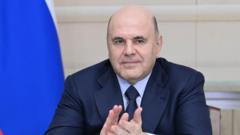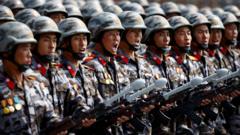As South Korea grapples with political upheaval following the impeachment of its president, U.S. Secretary of State Antony Blinken emphasized the enduring alliance between the two countries, addressing concerns about democracy and regional security during his visit to Seoul amid North Korea's escalating missile threats.
South Korea's Alliance Strengthened Amid Political Crisis

South Korea's Alliance Strengthened Amid Political Crisis
U.S. Secretary of State Antony Blinken reaffirms commitment to South Korea as both nations navigate democratic challenges and heightened regional tensions.
In a significant meeting held in Seoul, both U.S. Secretary of State Antony J. Blinken and South Korean Foreign Minister Cho Tae-yul acknowledged the ongoing challenges to democracy within their respective nations while underscoring the strong ties that intertwine the two countries. Mr. Blinken, during a news conference, expressed that the relationship was more significant than the fortunes of individual leaders, political parties, or governments. This declaration underscores the resilience of the U.S.-South Korea alliance, particularly as South Korea finds itself in a profound political crisis following the unexpected impeachment of its president, who was accused of declaring martial law.
During the conference, Mr. Blinken also reflected on the necessity for democratic nations to confront their challenges transparently. "What we’ve seen in our own country, as well as in other democracies that have faced challenges, is a response that is openly transparent, confronting problems directly," he noted, hinting at the broader implications for democracies globally.
On the regional front, while diplomatic conversations proceeded, North Korea once again asserted its military capabilities by launching an intermediate-range ballistic missile off its east coast. This action follows two previous missile tests in the same year, underscoring the continuing threat from Pyongyang. Moreover, Mr. Blinken expressed concerns that Russia may begin providing North Korea with space and satellite technology, potentially facilitating advancements in its controversial nuclear weapons program, contradicting decades of disarmament policies.
As South Korea grapples with its internal strife, the U.S. remains poised to support its ally, reaffirming the necessity of their partnership in addressing regional conflicts and the broader implications for democratic governance in face of authoritarian challenges.
During the conference, Mr. Blinken also reflected on the necessity for democratic nations to confront their challenges transparently. "What we’ve seen in our own country, as well as in other democracies that have faced challenges, is a response that is openly transparent, confronting problems directly," he noted, hinting at the broader implications for democracies globally.
On the regional front, while diplomatic conversations proceeded, North Korea once again asserted its military capabilities by launching an intermediate-range ballistic missile off its east coast. This action follows two previous missile tests in the same year, underscoring the continuing threat from Pyongyang. Moreover, Mr. Blinken expressed concerns that Russia may begin providing North Korea with space and satellite technology, potentially facilitating advancements in its controversial nuclear weapons program, contradicting decades of disarmament policies.
As South Korea grapples with its internal strife, the U.S. remains poised to support its ally, reaffirming the necessity of their partnership in addressing regional conflicts and the broader implications for democratic governance in face of authoritarian challenges.



















